Associated Press
April 21, 2008
http://ap.google.com/article/ALeqM5j7CMHl_nRqEaAwSLE_odoujTS4FgD906683G1
NEW YORK (AP) — Pope Benedict XVI's U.S. visit left behind the impression of a compassionate and candid leader who has made a successful transition from professor to pope.
But it's uncertain whether the pontiff's six-day pilgrimage, which ended Sunday, will make a lasting imprint on a country he obviously admires.
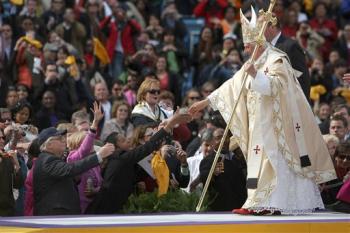 |
| Pope Benedict XVI greets people in the crowd as he celebrates a Mass at Yankee Stadium, in New York on Sunday, April 20, 2008. Photo by AP |
"In the short term, the trip was an enormous success, probably beyond anyone's expectations, including those of the pope himself," said Russell Shaw, a Catholic writer and former spokesman for the U.S. bishops' conference. "Whether the trip is going to have a significant outcome regarding the large problems facing American Catholicism, that's anyone guess."
In Washington and New York, Benedict sounded themes about truth trumping moral relativism, rich nations' responsibility to care for poor ones, and Catholics' call to live out their faith in the public square. Above all, the pope urged his audiences to find hope in Jesus Christ.
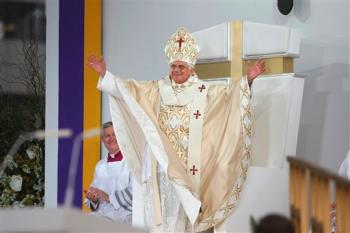 |
| Pope Benedict XVI celebrates Mass at Yankee Stadium in New York on Sunday, April 20, 2008. Photo by Chang W. Lee |
Benedict did not come to make provocative political statements, opting for measured tones. He spoke of keeping immigrant families together but not specific policy prescriptions. He called for peace but did not publicly address the war in Iraq.
He took an unusual journey into the personal, recalling the struggles of his youth in Nazi Germany living under a "sinister" regime.
He knelt in silence at Ground Zero, where for several moments the only sounds were the wind and camera shutters.
One day, Benedict gave a philosophical speech to United Nations diplomats in the morning and was the closing act for an American Idol and a rapping friar at a youth rally in the afternoon.
He seemed comfortable both places.
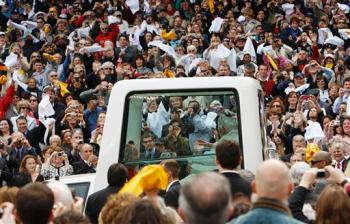 |
| Pope Benedict XVI arrives in the popemobile for Mass at Yankee Stadium in New York Sunday, April 20, 2008. Photo by Mike Segar |
Benedict's journey will be best remembered for his repeated comments about the shame of the church's clergy sexual abuse crisis. He held a dramatic private meeting with five abuse victims from the scandal-scarred Boston archdiocese.
"For me, the takeaway from this whole week is the fact he met with abuse victims," said Bill McGarvey, editor of BustedHalo.com, a Web-based magazine owned by a Catholic religious order. "He did it. It was a pastoral, private moment. He mentioned the scandal repeatedly. Pope Benedict is aware American Catholics need to talk about it — and heal. That is profound."
John Allen Jr., a senior correspondent with the National Catholic Reporter, an independent weekly, said Benedict came off as candid, kind and comfortable with the adoring crowds.
"Basically, he seems like a nice guy," Allen said, "which already is an advance over what some of his publicity was three years ago when he was elected."
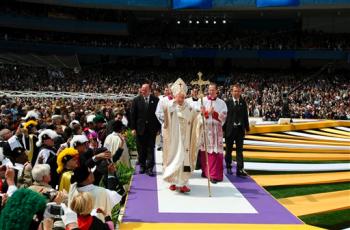 |
| Pope Benedict XVI arrives to celebrate Mass at Yankee Stadium in New York Sunday, April 20, 2008. Photo by Chang W. Lee |
Benedict also lamented divisions within the church. Some American Catholics emphasize the church's conservative moral stances on abortion, embryonic stem cell research and gay marriage; others champion its more liberal stances on poverty and the death penalty.
The pope during his trip condemned abortion, but also spoke of "the right to life of every human being from conception to natural death."
"I think the lasting impact of the visit will really be to unite Catholics in one family of faith," said the Rev. Drew Christiansen, editor of America, a Jesuit magazine.
Shaw, however, is skeptical that Benedict's first U.S. visit as pope, however well-received, will reverse U.S. Catholicism's troubling trends: declines in Mass attendance, a priest shortage, hemorrhaging membership and struggles to meet the needs of a fast-growing Hispanic population.
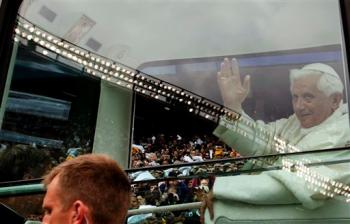 |
| Pope Benedict XVI arrives for a Mass at Yankee Stadium in New York, Sunday April 20, 2008. Photo by Mike Segar |
"I saw the same phenomenon at the time of John Paul II," Shaw said. "The big crowds, the enthusiasm, the charisma. Looking back 20 or 25 years later — in terms of anything you can quantify in American Catholicism — it's all been downhill."
The pope's farewell to America came at a Mass on Sunday at storied Yankee Stadium.
Before the pontiff arrived to chants and waving flags, a priest waited in line for popcorn.
The Rev. Michael Whyte wore a black cassock and white surplice, or tunic — special vestments to distribute Holy Communion. A parish priest from the Hartford, Conn., archdiocese, Whyte said Benedict's trip has filled Catholics with pride — especially young Catholics.
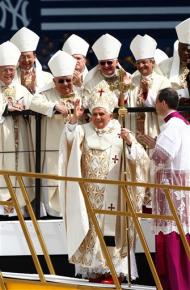 |
| Pope Benedict XVI arrives to celebrate Mass at Yankee Stadium in New York Sunday, April 20, 2008. Photo by Mike Segar |
"I believe his humility and dedication to God and church will be felt for years to come," Whyte said. "He's going to call us back to tradition, what we truly believe."
Standing on an exit ramp after the papal Mass let out, Kathy O'Shea of Fairfield, Conn., seized on one theme of Benedict's U.S. trip: engaging in the public square.
"I really hope this kind of rekindles the fire, especially in this election year," said O'Shea, a literacy volunteer. "Our economy is failing, our morality is failing. I think we just really need to relight that fire. This was absolutely the perfect time for him to come."
A few hours later, Benedict XVI climbed aboard the Italian jetliner known as Shepherd One, leaving it to America's 65 million Catholics to decide what to do now that he's gone.
Any original material on these pages is copyright © BishopAccountability.org 2004. Reproduce freely with attribution.